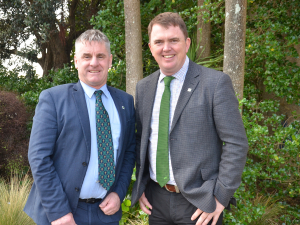Editorial: RMA reforms uproar
OPINION: The euphoria over the Government’s two new bills to replace the broken Resource Management Act is over.
 Federated Farmers president Wayne Langford (right) and national vice president Colin Hurst want NZ to remain in the Paris climate deal.
Federated Farmers president Wayne Langford (right) and national vice president Colin Hurst want NZ to remain in the Paris climate deal.
Federated Farmers is joining major industry-good bodies in not advocating for the Government to withdraw from the Paris Agreement.
A remit submitted by "a group of provinces" for NZ to withdraw from the climate change pact at the Feds' annual meeting in Christchurch last month was voted down.
Feds president Wayne Langford believes there's no point in debating whether to stay in or leave the Paris Agreement.
"We could spend a whole heap of time, energy and money fighting against the Paris Agreement, but I just don't see that as a good use of our resources. It's not going to happen," Langford told Rural News.
"The Government have been very clear about that, so have our trade negotiators, and our largest exporters. It would be total economic sabotage and farmers would pay the price.
"I've sat in rooms with dairy company leader who have said it could shave as much as $3 off the dairy price - so why would we even be talking about it?"
Groundswell leader Bryce McKenzie isn't surprised. He says Federated Farmers normally take a more conservative line than what they do.
"They also must work with Government on policy so may be working strategically.
"They do have to be careful though as many of their subscription paying members are adversely affected by what is in the Paris Agreement," McKenzie told Rural News.
Langford says that his organisation is focusing on domestic policy settings, "which is where the rubber really hits the road for Kiwi farmers - domestic methane targets, emissions pricing, and that sort of thing."
"That's where the real cost sits, and the danger for our rural communities, so we're pushing back strongly on those domestic methane targets ot make sure they're much lower.
"We're also 100% opposed to any price on agricultural emissions - end of story. We're just not having a bar of it."
He confirmed that at Federated Farmers' annual meeting, there were a range of views on the issue, but at the end of the day, the remits from various provinces didn't pass.
Langford says this shows the real strength of Federated Farmers.
"People can bring a policy position forward from their provinces for discussion, there is a robust debate, and we move forward united together.
"We've got some really solid people sitting around our national council table. Some are old and wise, others are young and enthusiastic, but all of them are passionate about farming."
Industry-good organisations DairyNZ and Beef+Lamb NZ are warning of major risks of walking away from the Paris Agreement.
"There are real trade risks if New Zealand withdraws from Paris - it would not just be symbolic," says B+LNZ chair Kate Acland.
"Walking away from the Paris Agreement would also put at risk our credibility as a high-value, responsible producer and trading partner.
"We would join a small group of countries outside the agreement - Libya, Yeme, Iran, Eritrea, and South Sudan," she says.
The Meat Industry Association of New Zealand (MIA) today announced that Chief Executive Officer Sirma Karapeeva has resigned from the role.
The winners of the 2026 Hawke’s Bay/Wairarapa Dairy Industry Awards were announced at the annual awards dinner held at Copthorne Solway Park in Masterton on Thursday evening.
Environment Southland is welcoming this week’s decision by the Environmental Protection Authority (EPA) to approve the release of Blaptea elguetai, a leaf‑feeding beetle that will help control the highly invasive Chilean flame creeper.
This March, the potato industry is proudly celebrating International Women’s Day on 8 March alongside the International Year of the Woman Farmer, recognising the vital role women play across every part of the sector — from paddocks and packhouses to research, leadership, and innovation.
Fruit trader Seeka posted a record profit and returns to shareholders in 2025.
Recent weather events in the Bay of Plenty, Gisborne/Tairawhiti, and Canterbury have been declared a medium-scale adverse event.